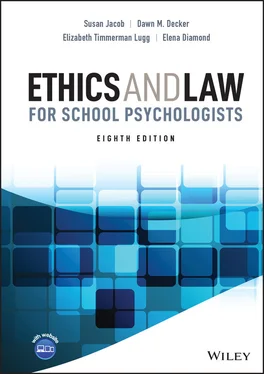Susan Jacob - Ethics and Law for School Psychologists
Здесь есть возможность читать онлайн «Susan Jacob - Ethics and Law for School Psychologists» — ознакомительный отрывок электронной книги совершенно бесплатно, а после прочтения отрывка купить полную версию. В некоторых случаях можно слушать аудио, скачать через торрент в формате fb2 и присутствует краткое содержание. Жанр: unrecognised, на английском языке. Описание произведения, (предисловие) а так же отзывы посетителей доступны на портале библиотеки ЛибКат.
- Название:Ethics and Law for School Psychologists
- Автор:
- Жанр:
- Год:неизвестен
- ISBN:нет данных
- Рейтинг книги:3 / 5. Голосов: 1
-
Избранное:Добавить в избранное
- Отзывы:
-
Ваша оценка:
- 60
- 1
- 2
- 3
- 4
- 5
Ethics and Law for School Psychologists: краткое содержание, описание и аннотация
Предлагаем к чтению аннотацию, описание, краткое содержание или предисловие (зависит от того, что написал сам автор книги «Ethics and Law for School Psychologists»). Если вы не нашли необходимую информацию о книге — напишите в комментариях, мы постараемся отыскать её.
Ethics and Law for School Psychologists
Ethics and Law for School Psychologists
Ethics and Law for School Psychologists — читать онлайн ознакомительный отрывок
Ниже представлен текст книги, разбитый по страницам. Система сохранения места последней прочитанной страницы, позволяет с удобством читать онлайн бесплатно книгу «Ethics and Law for School Psychologists», без необходимости каждый раз заново искать на чём Вы остановились. Поставьте закладку, и сможете в любой момент перейти на страницу, на которой закончили чтение.
Интервал:
Закладка:
As noted previously, public schools are an arm of state government. Historically, under common law, a school district could not be held liable for torts committed by the district, officials, or other employees (Russo, 2018). In some states, the immunity of school districts was based on the old English doctrine of sovereign immunity : “The king (state) can do no wrong; you can’t sue the king.” In other states, immunity of school districts was based on the fact that state law provides no funds for the payment of damages; funds for education could not be diverted to pay legal claims (Russo, 2018).
Currently, the doctrine of immunity of school districts has been modified by legislation or case law in most states. However, the exceptions to the doctrine of immunity vary from state to state, making it extremely difficult to make generalizations about the kinds of tort actions that will be successful against school districts in various states. Immunity usually exists to the extent that the school’s or school board’s liability insurance does not cover the particular injury suffered (Schill, 1993, p. 1). This means that, in many states, state legislation or case law permits lawsuits against school districts but allows recovery only up to the limits of the school’s liability insurance (see Russo, 2018).
School-based practitioners must remember that they are state actors and district employees. As a result of a long history of negligence lawsuits against schools, school-based practitioners, like other school employees, have a legal duty to take steps to protect students from reasonably foreseeable risk of harm . This obligation extends to all students, not just student clients. Furthermore, school employment contracts often contain a provision whereby any act or failure to act that jeopardizes student health, safety, or welfare can result in the suspension or termination of employment. However, schools are not guarantors of student safety. Schools are not likely to be held liable when spontaneous, unforeseeable acts by students result in injury (Wood & Chestnutt, 1995; see, e.g., Kok v. Tacoma School District No. 10 , 2013).
Whether a state will allow recovery of damages in lawsuits against school districts is a complicated matter. Whether individual school employees can be sued is also a complicated matter, determined by state legislation and case law. State courts typically have held teachers and other individual school employees immune from liability during performance of duties within the scope of their employment. They may, however, be disciplined by their district for inappropriate actions. School employees are not immune from liability for intentional torts or criminal acts.
School-based practitioners have a duty to protect students from reasonably foreseeable risk of harm; psychologists in nonschool settings also may have a professional obligation under the laws of the state where they practice to take steps to protect their clients from self-harm and to forewarn individuals whom their client has threatened to harm. However, where they exist, state laws governing mental health practitioners often use language that requires the psychologist to take preventive actions only in situations suggesting “clear and imminent” danger to the client or a targeted victim. Thus, a difference may exist between school-based practitioners and those in nonschool settings with regard to the threshold for breaking confidentiality of the psychologist–client relationship to protect a student or others from harm (i.e., reasonably foreseeable risk of harm versus imminent danger) (also see Chapter 3).
As noted, many of the negligence suits filed against school districts by parents are precipitated by a physical injury to a student (Evans, 1997). In the 1970s and 1980s, however, a number of so-called instructional malpractice suits were decided. These suits were filed by students or their parents when a student graduated from high school but was unable to read or write well enough to secure employment, or when the student did not achieve academically what their parents expected. The plaintiffs in these cases claimed that poor instruction (instructional malpractice) was the cause of the injury (student failure to learn). Such claims generally failed for several reasons. First, the courts prefer not to intervene in the administration of the public schools except in unusual circumstances involving clear violations of constitutional rights or federal law. Second, the courts have held that the award of monetary damages for instructional malpractice suits would be overly burdensome to the public education system in terms of both time and money ( Peter W. v. San Francisco Unified School District , 1976). In addition, as noted in Donohue v. Copiague Union Free School District (1979), it would be difficult, if not impossible, to prove a causal link between a school’s instructional practices and student academic failure.
Worthy of mention is the literacy lawsuit out of the Sixth Circuit. In the case of Gary B. v Whitmer (2020), the court held that as a matter of first impression, the 14th Amendment Due Process Clause provided the student plaintiffs with a fundamental right to a basic education, meaning one that provided access to literacy. The students had filed suit alleging that they had been denied access to literacy on account of their races in violation of the 14th Amendment Due Process and Equal Protection Clauses. One month after the decision was handed down, a rehearing en banc was granted in May 2020. In June 2020, prior to rehearing, the state of Michigan reached a settlement with the students which included $95.4 million in future funding earmarked for literacy, a $280,000 damage payment to be split among the seven student plaintiffs, and the creation of two task forces in Detroit to pursue quality education for students in Detroit.
While the lawsuit starts a new precedence regarding the duty of public schools toward students, implementing the terms of the settlement faces hurdles. Governor Whitmer has vowed to introduce legislation providing the $94.5 million in funding for literacy, but such legislation must make its way through a Republican-controlled legislature. What is important for jurists is that precedent on the duty to provide access to literacy has been established.
Lawsuits under Federal Law (Section 504, ADA, IDEA, and Section 1983)
Federal antidiscrimination laws, such as Section 504, ADA, and Title IX of the Education Amendments of 1972, allow parents to sue a school district for violation of their child’s rights under those laws. In successful suits, parents have been able to secure a court order commanding the school to take steps to comply with the law, and at times they have been awarded monetary damages (see Chapters 5and 9).
IDEA also allows parents of special education students to file a lawsuit when they believe their child’s rights under the law have been violated. Except for unusual circumstances, parents are required to exhaust administrative remedies (e.g., due process hearings) available to them before they pursue a court action under IDEA. If parents prevail in a court action under IDEA, they may recover their attorney fees and/or be reimbursed for private school tuition or compensatory education for their child (see Chapter 4). Parents typically have not been able to recover monetary damages under IDEA.
In addition to claims filed under Section 504, ADA, and IDEA, an increasing number of lawsuits are filed against schools and school personnel under Section 1983 of the Civil Rights Act of 1871. In accordance with Section 1983, any person whose constitutional rights (or rights under federal law) have been violated by a government official may sue for damages in federal court, and the official may be held liable for the actual damages. Section 1983 lawsuits often are referred to as “constitutional torts,” and, similar to common torts, the court decides whether there was a duty to a student, whether the duty was breached (i.e., the student was deprived of their rights under constitutional or federal statutory law by a public official), whether the student suffered injury, and whether the breach of duty was the proximate cause of the student’s injury. A student whose civil rights were violated under Section 1983 may sue the school board, principal, teacher, and/or the school psychologist responsible in federal court, thereby bypassing any state law granting school personnel immunity from liability during performance of their job duties.
Читать дальшеИнтервал:
Закладка:
Похожие книги на «Ethics and Law for School Psychologists»
Представляем Вашему вниманию похожие книги на «Ethics and Law for School Psychologists» списком для выбора. Мы отобрали схожую по названию и смыслу литературу в надежде предоставить читателям больше вариантов отыскать новые, интересные, ещё непрочитанные произведения.
Обсуждение, отзывы о книге «Ethics and Law for School Psychologists» и просто собственные мнения читателей. Оставьте ваши комментарии, напишите, что Вы думаете о произведении, его смысле или главных героях. Укажите что конкретно понравилось, а что нет, и почему Вы так считаете.












